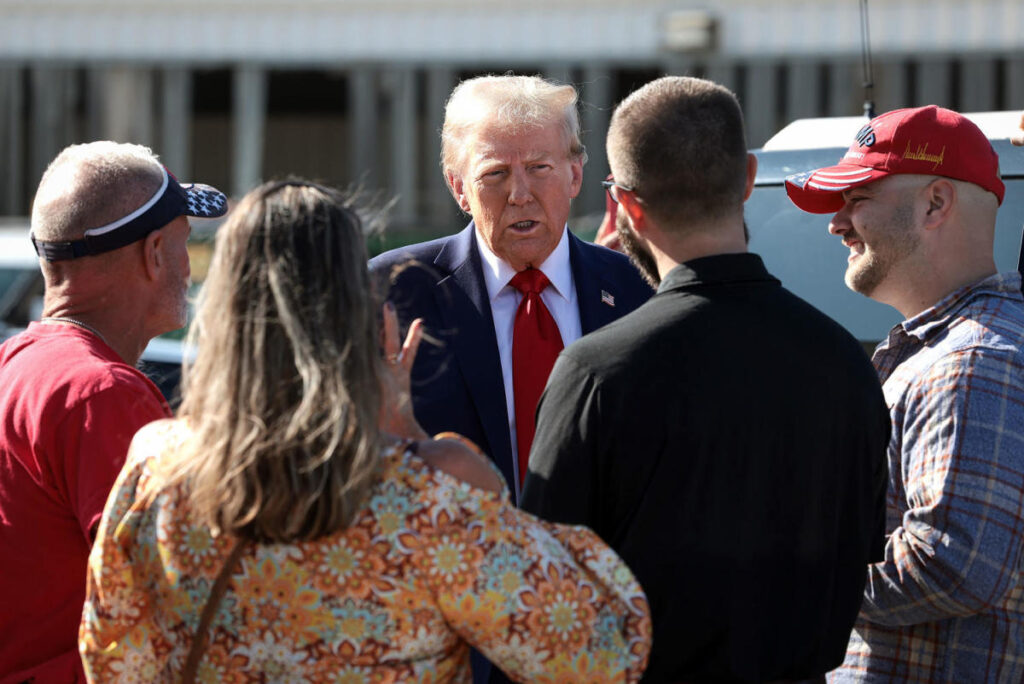In recent discussions surrounding the ongoing conflict in Gaza and the recent death of Hamas leader Yahya Sinwar, former President Donald Trump weighed in with remarks that align with those from current President Joe Biden and Vice President Kamala Harris. During a public event in Detroit, Trump stated that Sinwar’s death would make it “easier” to end the conflict, echoing sentiments expressed by Biden and Harris regarding the implications of Sinwar’s demise. When questioned by NBC News about the potential for peace following Sinwar’s death, Trump reiterated that it had the potential to simplify peace efforts while refraining from expanding on his reasoning. His comments reflect a consensus among several U.S. leaders that the elimination of Sinwar, who had a significant role in orchestrating the Oct. 7, 2023, attacks on Israel, might provide a strategic opening for renewed peace talks.
Yahya Sinwar, regarded as one of the key figures in Hamas and the alleged strategist behind the deadly attacks that left approximately 1,200 people dead and many more taken hostage, met his end at the hands of Israeli soldiers in southern Gaza. While initial reports of his death circulated on Wednesday, it was confirmed by Israeli sources on Thursday. Sinwar’s leadership in these violent incidents has been a pivotal point of contention in the broader conflict, which has escalated dramatically, resulting in the loss of over 42,000 lives in Gaza according to local health officials. The extensive casualties have heightened international scrutiny and calls for a resolution, raising the stakes in the current discussions on how best to achieve peace in the region.
Vice President Kamala Harris also voiced her perspective on Sinwar’s death, deeming it a moment of “justice” and suggesting that it bodes well for both the U.S. and Israel, as well as the global community at large. Harris articulated that this pivotal moment should be leveraged to forge a path toward peace that ensures Israel’s security, the release of hostages, and an end to the suffering in Gaza. In her view, the death of Sinwar creates a unique opportunity for addressing the humanitarian needs of the Palestinian people while acknowledging their rights to dignity and self-determination. This framing underscores a crucial aspect of the political discourse—recognizing the intertwined fates and rights of both Israelis and Palestinians in the quest for resolution.
President Biden echoed similar sentiments during his trip to Germany shortly after Sinwar’s confirmed death. In remarks to reporters, he condemned Sinwar’s actions and highlighted the numerous lives lost due to his leadership. Biden noted that following Sinwar’s demise, he communicated with Israeli Prime Minister Benjamin Netanyahu, expressing the need to seize this moment to pursue a path to peace in Gaza that does not involve Hamas. His approach emphasizes a transitional strategy, moving away from conflict and toward a future that prioritizes stability and security for all parties involved. By framing it this way, Biden appears to be advocating for a broader shift in policy not only toward Israel but also regarding how the U.S. engages with the ongoing humanitarian crisis in the Palestinian territories.
The comments from Trump, Biden, and Harris collectively reflect a moment of alignment among U.S. political leaders regarding the potential implications of Sinwar’s death on the ongoing conflict. Each leader perceives the situation as an inflection point, emphasizing the necessity of pursuing peace while addressing the security concerns that underpinned the violence in Gaza. This narrative is pivotal as it seeks to balance the immediate implications of military actions with long-term strategies for a sustainable resolution in the region. The bipartisan notion that Sinwar’s absence could create an opportunity for renewed efforts toward peace serves as a critical part of the discourse, bridging what has often been a polarized view on how to handle Middle Eastern conflicts.
As the situation evolves, the aftermath of Sinwar’s death poses a series of challenges and opportunities for the future of Gaza and Israeli-Palestinian relations as a whole. While addressing the immediate security threats posed by Hamas, there lies a broader imperative to engage deeply with the underlying issues that breed conflict, including humanitarian needs and political aspirations on both sides. The call for a strategic approach that ensures the security of Israel, the tranquility of the Palestinian populace, and the release of hostages suggests a complex interplay of negotiation, mediation, and diplomacy that will require careful navigation in the months and years ahead. Ultimately, the success of these leaders’ attempts to forge a new path forward will depend significantly on their ability to craft an inclusive dialogue that addresses both the immediate and long-standing grievances of the region.

